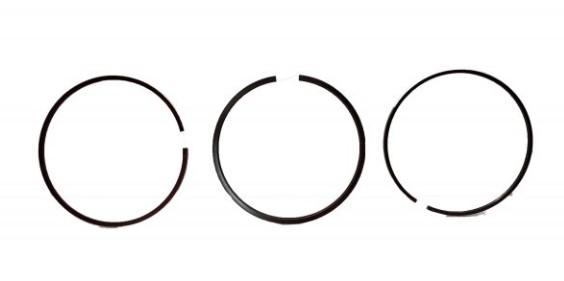If you are reading up about what are the symptoms of a bad piston rings, then you are in the right place.
The pistons in your bus or trucks are made up of rings of metal. These rings help control the oil pressure in the engine and keep the engine from running too lean or too rich. Without the proper lubrication of the piston rings, you will have all kinds of problems occurring in your engine. Even though the piston rings are small and inexpensive, they are critical for the operation of the engine.

Every ring is different and all three rings have different roles. Together they help seal the combustion chamber, lubricate the cylinder walls, and allow heat to be transferred. When piston rings are worn or damaged, they can cause many different problems. If you drive with bad piston rings, your car can become unbalanced and even have a blowout.
What Are Piston Rings?
From wikipedia, A piston ring is a metallic split ring that is attached to the outer diameter of a piston in an internal combustion engine or steam engine. Their main functions of piston rings in engines are:
- Sealing the combustion chamber so that there is minimal loss of gases to the crank case.
- Improving heat transfer from the piston to the cylinder wall.
- Maintaining the proper quantity of the oil between the piston and the cylinder wall
- Regulating engine oil consumption by scraping oil from the cylinder walls back to the sump.
Pistons must form a tight seal against the cylinder walls in order to get complete and efficient combustion. This seal is created by a series of piston rings that envelop the piston. The engine’s pistons move up and down inside the cylinder, which forces the connecting rod to turn.
5 Symptoms of a Bad Piston Rings
Lack Of Lubrication
When the pistons move up and down in the cylinder, the piston rings have the job of ensuring that they allow adequate heat transfer and move smoothly. If the lubrication is insufficient or the oil is contaminated with grinding particles, it will cause the piston rings to wear prematurely.
In addition, it’ll also contribute to the damage along the piston walls. You can prevent this problem by checking the engine oil regularly and changing it when it needs to be changed.
Too Much Exhaust Smoke
If there’s a lot of smoke coming out from your vehicle, this could be a sign that you have worn out your piston rings. The smoke will look very thick and have dark gray and blue colors. A burning oil smell is what it often has. There is a chance that engine oil will leak into the combustion chamber when there is bad piston rings. The thick blue gray smoke that you see coming out is caused by the oil burning and creating the smoke.
Poor Acceleration
Another symptoms of a bad piston rings is poor acceleration. The piston rings in an engine regulate compression and lubrication.
The piston rings that wear out and become loose, causing engine problems and not enough lubrication are the reason your vehicle loses power and becomes difficult to handle. If your piston rings suffer wear or get damaged, your engine will lose its power because there is less compression taking place.
Your piston rings are worn down and need to be replaced to fix the problem. Decreased acceleration can also be caused by damage to the engine valve seals.
Check the pistons and valves to make sure that they are tight. A bad valve seal would normally show up in an overly noisy engine, but an undersized or damaged piston ring will cause high compression.
Excessive Oil Intake
Next up on the list on symptoms of a bad piston rings is excessive oil intake.
Technically, oil in the air intake is often the result of blow-by. The blow-by is when the air/oil mixture in the combustion chamber moves past the piston rings and creates a positive pressure in the crankcase.
The PCV system is designed to vent exhaust emissions back into the engine through the inlet manifold where the air/fuel mixture is drawn in to initiate combustion.
Oil Leak
Last but not least on the list of symptoms of a bad piston rings is oil leak.
There is high pressure in the crankcase when the piston rings are not working. The engine seal will be damaged by this and the oil will leak. If you notice oil leaks, make sure to check the pressure on the crankcase.
The easiest way to do this is to turn off the engine and slowly open the oil cap. The vacuum should be small and there should be no pressure. If the oil cap comes out with a lot of smoke, it is possible that you have a bad ring.
How To Buy Piston Rings?
Now, that you know symptoms of a bad piston rings and if you want to buy piston rings to replace, read on.
Piston rings come with different sizes and dimension. One of the way to know what size to buy is by measuring both the radial width and axial height of the oil ring assembly. But if this seem technical for you or you would rather have a sales rep assisting you, your are welcome to contact us. All you need is to fill in the form found on this page.
Piston Rings FAQ
How Long Does Piston Rings Last?
Piston rings are usually built to last as long as the engine, lasting somewhere from 50,000 miles to 250,000 miles. But the usual life expectancy of piston rings comes at about 100,000 miles. So if you conduct proper maintenance you should have no problems with the piston rings. (source: https://vehiclefreak.com/)
What Are The Piston Rings Replacement Cost?
Piston ring replacement cost is between $1000 and $5000, depending on the car model and labor costs. The piston rings cost $40 to $200 depending on how many cylinders your car has. The labor work is between $1000 and $4000. (source: https://mechanicbase.com)
How Long Does It Take To Replace Piston Rings?
The entire replacement process will take average 10 – 12 hours.
How Many Miles Do Piston Rings Last?
Typically, piston rings are usually built to last as long as with the engine. A typical life expectancy of piston rings comes at about 100k miles. If proper maintenance is carry out at schedule, the life expectancy can be prolong.

